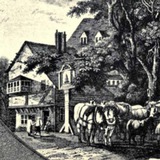No modern bar will ever compete with a traditional public house.
(The Blue Bell in #York, North #Yorkshire, #England. Picture by Horst A. Friedrichs for Great Pubs of England /Prestel.)
(The Blue Bell in #York, North #Yorkshire, #England. Picture by Horst A. Friedrichs for Great Pubs of England /Prestel.)
Even old illustrations of pubs both lost and living create a far more appealing image than the most extravagant of modern bars.
The Lion & Swan, #Congleton, #Cheshire, #England
The Lion & Swan, #Congleton, #Cheshire, #England
The Tabbard Inn, #Southwark, #London, #England
Established in 1307, it once stood on the east side of #Borough High Street, at the road's intersection with the ancient thoroughfare to #Canterbury and #Dover. Originally built for the Abbot of #Hyde in #Winchester, who bought the land to create a place for himself and his ecclesiastical folk to stay when working in #London
Among its stories, it was known for accommodating people who made the pilgrimage to the Shrine of #ThomasBecket in #Canterbury Cathedral, and it is mentioned in the 14th-century writings of the #CanterburyTales by Geoffrey Chaucer.
In the early 18th century, the new inn was making good business in stagecoach traffic between London and the channel ports because of the growth in turnpikes. By the early 19th century, it was solidified as a well-renowned coaching inn. However, with the birth of the railways, it eventually closed. The building eventually demolished in 1873. #RIP ⚰️
@VinnieSullivan
Established in 1307, it once stood on the east side of #Borough High Street, at the road's intersection with the ancient thoroughfare to #Canterbury and #Dover. Originally built for the Abbot of #Hyde in #Winchester, who bought the land to create a place for himself and his ecclesiastical folk to stay when working in #London
Among its stories, it was known for accommodating people who made the pilgrimage to the Shrine of #ThomasBecket in #Canterbury Cathedral, and it is mentioned in the 14th-century writings of the #CanterburyTales by Geoffrey Chaucer.
In the early 18th century, the new inn was making good business in stagecoach traffic between London and the channel ports because of the growth in turnpikes. By the early 19th century, it was solidified as a well-renowned coaching inn. However, with the birth of the railways, it eventually closed. The building eventually demolished in 1873. #RIP ⚰️
@VinnieSullivan
